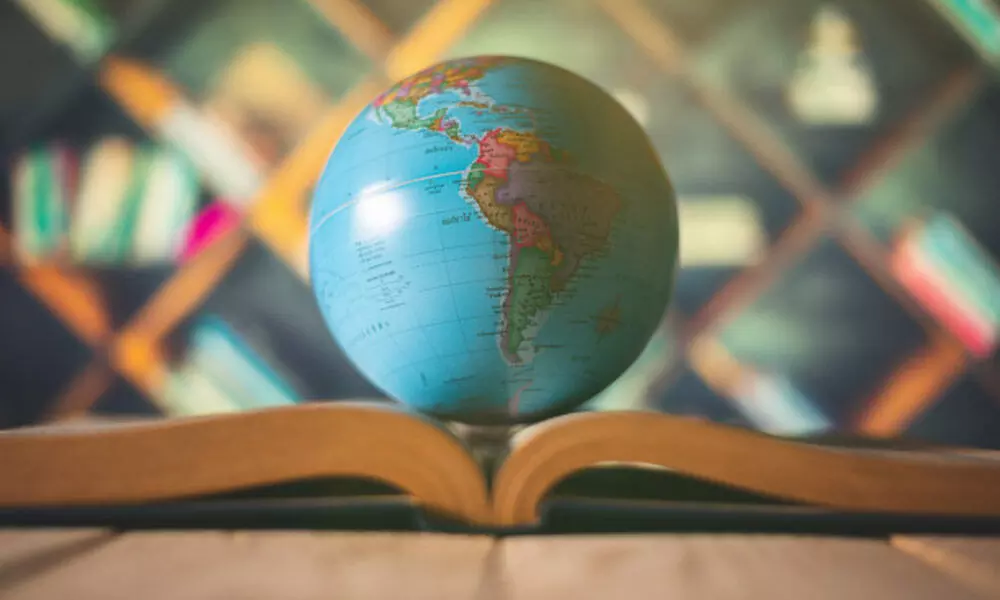Live
- Tensions Erupt Outside Allu Arjun's Residence as OU JAC Stages Protest
- DMK adopts resolution condemning Amit Shah's remarks on Ambedkar
- Truck Driver Brutally Murdered in Mulugu District
- Telangana State Cross Country Championship 2024 Successfully Conducted in Kalwakurthy
- Odisha: Collectors asked for proper assessment of crop loss due to unseasonal rainfall
- Woman flyer says Air India left passengers in the lurch in Milan
- ‘Nuvvu Gudhithe’ from ‘Drinker Sai’ is a playful exchange between lead pair
- ‘Marrichettu Kinda Manollu’ gets a grand launch
- Prabhas’ ‘Salaar: Part 1 - Cease Fire’ marks first anniv.
- PKL 11: Puneri Paltan aiming to finish season on high as tribute to their fans
Just In
Importance of global education courses


Importance of global education courses
The role of a teacher has constantly evolved and that is the way it should be
The role of a teacher has constantly evolved and that is the way it should be. We live in a constantly changing world where it is not only important what we know, but also what we do with what we know. Therefore, teaching is not only about telling our students all about what we know, but much more and beyond. As teachers we need to help them navigate through the increasingly complex social, economic, environmental, emotional challenges that are changing this world.
In the past, it was assumed that what we learn in school will last for a life, and teaching of knowledge and cognitive skills would be at the core of any teaching – learning process. In today's time, preparing students for the future requires a paradigm shift in instructional strategy from a very knowledge and content domain to knowledge co-creation, from receiving mere content from the text books to learning by experimenting, computing, to skills-based domains and many more attributes that a student needs to possess to face this ever-changing world.
This calls for a complete shift in the way teachers look at teaching and their entire professional development journey. 6 out of 10 teachers recognise this need and are ready to take on the challenge to make a shift in the way they teach and students learn. More teachers see their role not to simply impart knowledge from text books and content-based knowledge but to equip students with competencies and skills for life-long learning. Despite, all the changes and desired reforms more than 50% classrooms in India continue to focus on knowledge delivery and traditional practices continue to dominate classrooms. A dire need to address this disconnect is key to prepare the profession to teach for the future.
The impact of teaching is all about how the knowledge is conveyed and the instructional knowledge is transacted in classrooms. Without this know-how about how to transact or convey the knowledge, the expertise of the teacher no matter how great it may be, students will not be able to benefit out of the same. Hence, it is imperative that in schools of Education, trainee teachers are taught how to capture, assemble and disseminate the professional knowledge of classroom teaching. Traditional schools of Education focus more on the theoretical aspects and the models of teaching, and one can say that they are disconnected from the practical challenges of classroom teaching.
It is imperative, therefore that global education courses for teachers focus on the know-how of teaching for life and focuses on making teaching a more aspirational and professional path for career progression for teachers. So, what should be the pre-requisites for Global education courses and what should they deliver?
Global education courses should focus on Improving learning outcomes in classrooms. These courses should train teacher to learn from best practices through classroom observations and collaborative practices. Though classroom observations, one can learn the art of teacher interactions for starting lessons, transactional processes, the art of questioning, making adjustments to content basis of student response, the art of integrating current knowledge with classroom content, ways to embed skill building along with content delivery. In most classrooms, with the current focus on activity-based learning there is a lot of focus on how the content is delivered – through activity-based methods, but somehow there are huge pedagogical gaps in terms of student's own learning and how the teacher has delivered the lesson. Key here is to be able to identify the pedagogical gaps while fulfilling the other mandate like use of tech – tools, embedding skills like communication, critical thinking and research skills and at the same time making students comfortable with conceptual content and assessment knowledge. It does seem like a long list of desirable things that an ideal class must be, but yes, this is something so essential for a good lesson.
Ideally every Global education course should be able to cover aspects of classroom teaching know-hows, ways to build skills amongst students, methods of assessments, introduction of technology to leverage best teaching practices. Such courses should have a large practicum component with teachers observing each other and learning from each other. The knowledge of a profession can only be shared by professionals practicing the same. Who better to share the 'know-how' of teaching – learning than teachers to change what goes on in the classrooms? We can be more mindful about empowering our teachers and give them a stronger voice and choice to improve what matters most to student learning.
(The author is the Head - Curriculum Development & Training, Aditya Birla Education Academy)

© 2024 Hyderabad Media House Limited/The Hans India. All rights reserved. Powered by hocalwire.com






